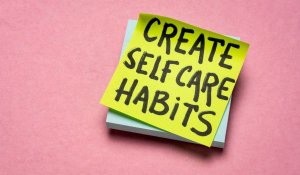 Taking care of oneself is an important part of staying healthy and happy. When people ignore their own needs, it can disrupt their daily routine and lead to feeling more stressed, tired, angry, or anxious, and may even lead to health issues. That’s why more people are raising awareness about self-care, especially as we celebrate International Self-Care Day on July 24th this year. This day, created by the International Self Care Foundation, highlights the importance of self-care and encourages everyone to include care practices in their daily routines. However, even with efforts to prioritize self-care, it can be frustrating when those practices don’t seem to help.
Taking care of oneself is an important part of staying healthy and happy. When people ignore their own needs, it can disrupt their daily routine and lead to feeling more stressed, tired, angry, or anxious, and may even lead to health issues. That’s why more people are raising awareness about self-care, especially as we celebrate International Self-Care Day on July 24th this year. This day, created by the International Self Care Foundation, highlights the importance of self-care and encourages everyone to include care practices in their daily routines. However, even with efforts to prioritize self-care, it can be frustrating when those practices don’t seem to help.
Many people don’t talk about why self-care can be so difficult. Things like going to the gym, eating healthy, keeping up with dentist visits, haircuts, or just getting enough sleep can feel more like chores than something that’s supposed to make you feel better. Instead of being refreshing, it can start to feel overwhelming. Most people already know the basics of staying healthy, but the more they learn and explore, the longer their to-do list for self-care seems to get instead of getting shorter. Some days, it feels almost impossible to do what needs to be done, even when it’s for their own well-being. So why does self-care, something that’s meant to feel good, sometimes feel so difficult and tiring?
Putting yourself first feels wrong
Self-care isn’t always easy, especially for those just starting to realize how important it is. It’s often easier to put others first and forget about their own needs, especially when they’re tired or short on time. But constantly ignoring one’s own well-being can take a toll over time. We need to “fill our own tank” so that we’re in a better position to help others. Taking care of oneself isn’t selfish; it’s necessary.
Self-care is exhausting
Taking care of yourself takes effort. Whether it’s going to bed on time, planning and cooking healthy meals, or sticking to an exercise routine, self-care requires work. When someone is feeling tired or overwhelmed, just when they need self-care the most, it can feel especially hard to find the energy to do it. But that’s okay. Understanding that self-care can be tough sometimes helps make it easier. It’s all about finding small changes or solutions that match how much energy you have in the moment.
Shame
Surprisingly, self-care can sometimes bring feelings of guilt or even shame. This could mean feeling guilty for being “selfish”, not doing things for others, but rather taking care of yourself. Shame can sneak in and make self-care feel harder, often leading to negative thoughts.
However, we can only be really helpful to other people if we are operating at our best and able to put 100% of our own strength and purpose into the effort needed by others less fortunate than ourselves. So, put shame aside, and take care of yourself first.
Seeking a quick dopamine hit
When people are tired, it’s tough for them to make good choices. If they get really worn out, they can lose focus and self-control. That’s when things like playing games, binge-watching Netflix, eating more dessert, or other tempting habits take over. When their brain is exhausted from making too many decisions, it becomes easier to get distracted or act on impulse.
It’s easy to lose control when you can engage in activities that trigger the brain’s reward system that’s driven by the “feel good” hormone dopamine. Things like playing games or scrolling on your phone can feel exciting at first, but they don’t always leave you feeling happy or satisfied. This can quickly turn into a cycle of always chasing the next win or looking for something more, and leaving little time for real self care.
Setting unrealistic goals
 People often set themselves up for failure without meaning to. It happens when they set goals or expectations that might feel doable on a good day but are too hard to handle when they’re tired or stressed. It’s not that they want to fail, but turning hopes into strict expectations can backfire. This can leave them feeling frustrated, guilty, or ashamed, especially when they need to stay strong the most.
People often set themselves up for failure without meaning to. It happens when they set goals or expectations that might feel doable on a good day but are too hard to handle when they’re tired or stressed. It’s not that they want to fail, but turning hopes into strict expectations can backfire. This can leave them feeling frustrated, guilty, or ashamed, especially when they need to stay strong the most.
Thinking self-care is a quick fix
After ignoring their own needs for a long time, someone might feel so excited about starting self-care that they expect it to fix everything right away. But self-care isn’t a quick fix. There’s no single thing a person can do just once that will make a lasting difference. Still, their excitement might make them believe it will change everything instantly. Self-care is all about taking steps to improve well-being. It’s not just one thing but a mix of different habits that fit your personal needs. Since everyone’s needs change over time, the ways they practice self-care should change too. It’s important to stay flexible and try different approaches to see what works best.
Self-care looks different for everyone, even if some strategies overlap. Things like getting enough sleep and staying hydrated are good for most people, but the amount or type that works best can vary. It’s not necessary to go running to a healthcare professional when looking for ways to improve your self-care. Simple over-the-counter aids are available that can help with general health, such as the Sleep Pack, that helps you fall asleep faster, and stay asleep longer, the Stress Pack, that feeds your body with the essential vitamins and minerals that help ypu cope with difficult times, and the Energy Pack and Performance Pack, that combine to give you the strength to help both yourself and others.
Sometimes, someone might share a new self-care habit that has totally improved their life, and it’s easy to think, “That must be what I need too!” While it might help, it’s also possible it won’t work the same way, or at all. It’s great to get ideas from others, but self-care isn’t one-size-fits-all. Everyone has to figure out what works best for them.
FAQs
Why is self-care hard?
Taking care of oneself isn’t always easy, especially when it involves breaking old habits or changing how someone thinks. For instance, a lot of people find it hard to move away from the idea that working all the time is more important than their health and well-being.
How much self-care per day?
Self-care doesn’t have to take hours. Most people only have 10 to 15 minutes in their day to spare. Using that time for something small and simple can make a bigger difference to their self-care routine than activities that take up several hours.
What are examples of self-care?
True self-care is about nurturing mental, social, and emotional well-being. Mentally, it can involve practicing mindfulness or engaging in hobbies that bring joy and relaxation. Social self-care includes spending quality time with loved ones, whether in person or virtually. Emotionally, it means setting boundaries or learning to say no, and prioritizing one’s own needs over constantly pleasing others. It can also include exercise, healthy eating, and getting a good night’s sleep.
Why is it so hard to care for yourself?
Many people struggle to feel like they deserve self-care. They think they could have done more or been better. They tell themselves there’s no time to focus on their own needs. They see self-care as something that takes too much time instead of something they can practice in small ways throughout the day.













